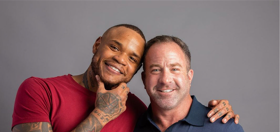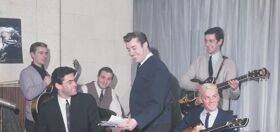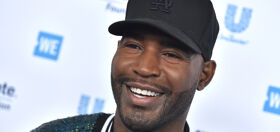
Yesterday we introduced you to gay Senatorial candidate Jim Neal, pictured above with one of his two sons.
The conversation continues today with our editor getting into the nitty-gritty of Neal’s current campaign.
Andrew Belonsky: What made you stop volunteering for or fundraising for campaigns, as you did for Kerry, and actually launch your own?
Jim Neal: Well, I’ve always wanted to do it. I was a little kid and wanted to be president. I don’t want to be president right now, but I have always contemplated running for federal office. I think there were two things that prevented me from moving on it. One was that when I did come out in my early-30’s, I thought, “Okay, that’s it. A gay person can’t run for public office. It’s off the table”. The times changed and that was no longer necessarily the prevailing wisdom, but I had custody of my two children. I was a single parent raising two young children and they came first. Their needs came first. That was the most difficult job I’ve ever had in my life, but it was also extraordinarily rewarding. Raising two kids with two parents is a challenge, much less one, because you have to be both dad and mom. You’ve got to have the maternal side and the more stereotypical father role. I think I yielded more to the maternal because I felt like my kids needed that, because they didn’t have it. Even before I declared my candidacy, I spoke with both my children – my boys, they’re not children anymore – and told them what it would entail, made it clear that I was the one running for office, they could be as involved or not be as involved as they wanted to be. They both said, “Go for it,” but my older son threw in the caveat, “Dad, please don’t ever forget the little guy.”
AB: Your sexuality is not the cornerstone of your campaign, but I want to talk a little about Chuck Schumer and how things went down with your campaign announcement and what could be perceived as the cold shoulder from your Democratic peers. Do you think that reaction tacitly stressed your sexuality?
JN: Not necessarily. There was a good deal of concern – not necessarily expressed, but certainly there were folks who were part of the status quo political system that found my candidacy threatening. They felt that a gay person on the ballot would draw out social conservatives to vote against me and therefore to vote for the other candidate on the ballot. My view of that – I didn’t foresee that. It didn’t even cross my mind. Chalk it up to political naivete, but it didn’t cross my mind because I think it’s silly. It’s analogous to the so-called conventional wisdom that said a black person could never be elected or a woman, much less a Roman Catholic to the White House. They were wrong then and they are wrong now.

AB: This entire thing and what happened with you and Schumer (pictured above) convinces me personally more and more that we need to somehow build a viable third party in the United States, which I don’t think is possible currently. Do you think the American political structure is sufficient – the electoral structure.
JN: I don’t think the electoral structure per se is flawed. I think the American people – and I think this year it’s obvious that elections have in one way or another have been referendums on hope, people voting their hopes, trying to identify with the candidate who they felt best embodied that. This year the metaphor for hope is “change” and change means we’re tired of the same old thing. We’re tired of politics, we’re tired of sound bites, handles, carefully crafted poll driven political animals who we vote into office, yet whose allegiance is to the special interest groups and the parties that put money in their coffers. I think that money, money is the corrosive influence in our political system.
AB: That’s interesting coming from someone who works in finance. Can you elaborate?
JN: Well, I don’t know – people who come from finance understand that people – there are incentives. Absolutely no doubt that I did raise a lot of money in 2004 for a number of candidate running for federal office. I refer to it as the dirty underbelly of democracy, and it really is. The pols that the very powerful in terms of wealth hoist people to the top of the ticket is not something I believe our forefathers foresaw as part of the structure of a true democracy. And therefore I think – and in part, we the voters, we the people are to blame, because we buy into that. We voted people into office who haven’t been accountable, who haven’t performed for us, who perform for special interest – moneyed or institutional – who helped elect them to office.
AB: What you were saying about the founding fathers – couldn’t you also say that they never really thought about it because they assumed that rich white men would lead America?
JN: [Laughs] I don’t think that would be an unreasonable – I don’t think it’s unreasonable to drop that theory on the table, but obviously when they were drafting the constitution – it was intended to be a living document and is interpreted as such, for the most part, by the judicial system. However, at the same time, the influence of money – perhaps that was just taken for granted…
AB: I am wondering how you’re past in finance – I’m very intrigued by this, I live in New York and we have Bloomberg, who I think is doing a hell of a job, I think he’s doing a great job –
JN: Agreed. I agree wholeheartedly.
AB: And much of his political philosophy is informed by the fact that he’s such an amazing business man. I’m wondering whether your background in finance influences your political philosophy – or how it’s going to brought to bear on your policy.
JN: It will definitely play a role in how approach and perform as a public servant in that the course of my career – I understand, I’ve negotiated – negotiating is a central part of what, one of the skill sets I’ve been able to own and do during the course of my career, in a number of different ventures. I do know that in able to get things done, in able to reach a deal or agree upon a law that’s being enacted, you have to be able to have buy-ins. You have to reach a point in which everybody around the table feels as if they have won. They walk away not feeling ripped off, but thinking, “Okay, this is fair. I didn’t get everything I wanted, but I got the great majority of what I wanted.” You can’t go into a negotiation having already insulted the party on the other side. That’s absolutely going to poison the conversation or the debate.
AB: I agree.
JN: That coupled with the fact that I understand markets- I understand when they work and I understand when they’re not working. That’s a perspective that I’ve learned and applied in the course of my career. Like anything else, I’m also a product of the mistakes I’ve made. I’ve told my kids and other people: you only fail in life when you don’t obtain an objective and don’t learn something in the process. If you don’t learn something, then you’ve failed, but as long as learn something, you’re not a failure. I think that has given me a perspective and brings a new perspective as opposed to someone who spent their career inside a political bubble, who has lost touch with the people they represent and their interests. Sometimes you just have to do the right thing. It’s not necessarily going to be consistent with what everybody wants or what the great majority of people want – poll driven, if you will, pandering – but, rather an approach or a stance that you feel strongly is going to be on the right side of history.
AB: If you don’t win, what would have learned from this experience? Or, what have you learned so far?
JN: I’ve learned that you can’t ever take anybody’s support for granted. Never, ever take someone for granted. In the LGBT community, I’m emphatic, “Don’t vote for me just because I’m gay”. It’s not a good reason. Vote for me because you think I’ll do the best job representing this state as a public servant and a representative of the people of New Carolina. That’s the only reason to vote for me – that’s the reason I would like people to vote for me. The other side of that would be if I were something else – if I came from another distinct socioethnic group to appeal to people to vote for me on that basis. That, again, is not what our democracy is all about. You have to be open-minded and look at issues that really matter.



















ProfessorVP
I don’t know if a gay man can win in North Carolina, but he sure can in South Carolina, and has won. Lindsey Graham.
Jim Neal
Enjoyed the conversation AB. I hope we’ll chat again down the road. And I urge those of you interested in voting and being a part of changing the paradigm go online to http://www.jimnealforsenate.com and make a contribution– and get your friends to do the same.
I’m gonna work like hell to give you a good return on your investment.
best,
jim neal
MattC
Please Gays, if you’re going to contribute to a candidate just because they’re gay–contribute to one who could actually win. It’s called the Victory Fund, and that’s what it’s there for.
http://www.victoryfund.org
People like California’s Chris Cabaldon, Jared Polis in Colorado, or Jim Roth in Oklahoma(!).
Sorry to be a negative Nancy, Jim, you seem like a nice guy, but snowball and hell come to mind unless someone snaps a pic of Elizabeth Dole eating a baby or kicking a puppy.
yalesing
gay man is ok,contribute his strength to local deveolping.he is promising,as a gay,i support his election,i meet many gay man on gaysinglehunt.com. they are also proponent of him
Charley
To run as an out gay candidate takes courage and should be supported. It serves to change prevaling mainstream thought that we are all self destructive young 24 hour party people at Gay Pride parades. Visibility in mainstream media is just as important as winning. Good luck Jim.
Charley
MATIC
I used to give to the Victory Fund in Charlotte NC, that is until huge sums of money were embezzled by it’s Chairman. I prefer to give directly to the candidate without a third party handing out my money. Same with HRC. They gave to a Republican candidate against our rights. Have never have given them a dime since.
George
I donated $25 to Jim Neal on a whim recently (I was high off excitement of Barack Obama’s Iowa win and then an email from Jim Neal’s campaign so I though “why not?”)
And I just got a Thanks You letter with a personal handwritten note from Jim himself. It was so nice.
Him quietly and calmly beating Dole fair and square in a southern state would be an amazing step for gay equality. I encourage anyone to make a small donation!
chandler in lasvegas
Dear MattC,
Your narrow minded dismissal is a pernicious symptom of what is bad about progressive gay politics. I have stopped making large donations to gay orgs, aside from the usual $35 a year membership that all have seemed to have adopted, and instead fund worthy candidates directly. Your arrogant statement tells me I should fund whom YOU choose. Jim’s candidacy in North Carolina is a worthy campaign. You do the people you mention a disservice by your hubris. MattC, you are a silly and ridiculous person.